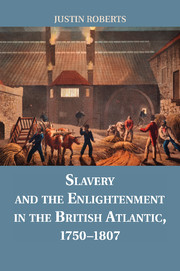Crossref Citations
This Book has been
cited by the following publications. This list is generated based on data provided by Crossref.
2016.
In the Wake.
p.
153.
Austen, Ralph A.
2017.
Monsters of Protocolonial Economic Enterprise: East India Companies and Slave Plantations.
Critical Historical Studies,
Vol. 4,
Issue. 2,
p.
139.
Wyman-McCarthy, Matthew
2018.
Perceptions of French and Spanish Slave Law in Late Eighteenth-Century Britain.
Journal of British Studies,
Vol. 57,
Issue. 1,
p.
29.
Marquese, Rafael de Bivar
and
Da Silva Júnior, Waldomiro Lourenço
2018.
Tempos históricos plurais: Braudel, Koselleck e o problema da escravidão negra nas Américas.
História da Historiografia: International Journal of Theory and History of Historiography,
Vol. 11,
Issue. 28,
Burnard, Trevor
and
Candlin, Kit
2018.
Sir John Gladstone and the Debate over the Amelioration of Slavery in the British West Indies in the 1820s.
Journal of British Studies,
Vol. 57,
Issue. 4,
p.
760.
Mauelshagen, Franz
2018.
The Palgrave Handbook of Climate History.
p.
413.
Smith, S. D.
and
Forster, Martin
2018.
“The Curse of the Caribbean”? Agency’s Impact on the Productivity of Sugar Estates on St. Vincent and the Grenadines, 1814–1829.
The Journal of Economic History,
Vol. 78,
Issue. 2,
p.
472.
Cournil, Mélanie
2018.
« What Dangerous Men » : La pratique de la médecine sur l’île de la Dominique à la fin du xviiie siècle.
XVII-XVIII,
Heath, Elizabeth
2018.
Sugarcoated Slavery: Colonial Commodities and the Education of the Senses in Early Modern France.
Critical Historical Studies,
Vol. 5,
Issue. 2,
p.
169.
Ward, J. R.
2018.
The amelioration of British West Indian slavery: anthropometric evidence.
The Economic History Review,
Vol. 71,
Issue. 4,
p.
1199.
Katz, Steven T.
2019.
The Holocaust and New World Slavery.
Tyson, Thomas N
and
Oldroyd, David
2019.
Accounting for slavery during the Enlightenment: Contradictions and interpretations.
Accounting History,
Vol. 24,
Issue. 2,
p.
212.
Schwarz, Katarina
and
Nicholson, Andrea
2020.
Collapsing the Boundaries Between De Jure and De Facto Slavery: The Foundations of Slavery Beyond the Transatlantic Frame.
Human Rights Review,
Vol. 21,
Issue. 4,
p.
391.
Graham, Aaron
2020.
Patents and invention in Jamaica and the British Atlantic before 1857 †.
The Economic History Review,
Vol. 73,
Issue. 4,
p.
940.
Wright, Gavin
2020.
Slavery and Anglo‐American capitalism revisited .
The Economic History Review,
Vol. 73,
Issue. 2,
p.
353.
Williams, J'Nese
2021.
Plantation Botany: Slavery and the Infrastructure of Government Science in the St. Vincent Botanic Garden, 1765–1820 s**.
Berichte zur Wissenschaftsgeschichte,
Vol. 44,
Issue. 2,
p.
137.
Graham, Aaron
2021.
Slavery, capitalism, incorporation and the Close Harbour Company of Jamaica, circa 1800.
Business History,
Vol. 63,
Issue. 5,
p.
705.
Bassett, Hayden F.
2022.
Plantation Roads and the Impositions of Infrastructure: An Archaeology of Movement at Good Hope Estate, Jamaica.
Journal of African Diaspora Archaeology and Heritage,
Vol. 11,
Issue. 1,
p.
48.
Cleall, Esme
and
Gust, Onni
2022.
Disability as a Problem of Humanity in Scottish Enlightenment Thought.
The Historical Journal,
Vol. 65,
Issue. 2,
p.
328.
Ward, J. R.
2023.
Demographic trends in late‐slavery Jamaica, 1817–32.
The Economic History Review,
Vol. 76,
Issue. 1,
p.
60.





